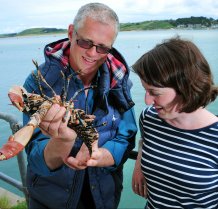Articles

Dom Boothroyd, General Manager of the National Lobster Hatchery with Dr Amber Teacher from the Environment and Sustainability Institute.
Image: Toby Weller
Science could help Cornwall lead the world in sustainable lobster fishing
South West scientists are carrying out research that could help Cornwall lead the way in developing a sustainable approach to managing lobster stocks.
Biologists from the University of Exeter’s Environment and Sustainability Institute (ESI) at the Penryn Campus are assessing the impact of the National Lobster Hatchery’s activities on wild lobsters around Cornwall’s coast.
The National Lobster Hatchery works with local fishermen, who provide egg bearing female lobsters. The hatchery then cares for the baby lobsters to give them the best chance of survival, before releasing them into the sea one and a half to three months later.
The ESI’s genetic research could help the hatchery decide where, when and how it releases baby lobsters in the future. This will help the Padstow charity ensure it benefits Cornwall’s rich marine life while also boosting the local economy by providing fishermen and restaurants with a sustainable supply of lobsters.
The ESI scientists are gathering DNA samples from lobsters around Cornwall’s coastline. These ‘genetic markers’ will uncover differences between groups of lobsters, and tell us whether there are separate sub-populations of lobsters around Cornwall.
Very little is known about how far lobsters travel and whether or not they stay within distinct groups. Previous attempts to understand this have been based on tagging, but the team believes that gathering DNA samples will give more accurate results.
To gather and collate details on Cornwall’s lobster populations, the research team is using a new app developed with FoAM Kernow, a technology company based at Penryn’s Jubilee Wharf. This allows researchers on board fishing vessels to photograph each lobster they find. They then record its location and generate a unique ID number, which is uploaded to a database and a publicly-accessible website. Specially designed to be user-friendly in this harsh environment, the app allows scientists to gather these data very quickly on a smartphone with the click of just one button.
ESI scientists are also working to understand differences between lobsters reared at the hatchery and their wild counterparts. They are assessing the impact of different temperatures and light conditions on lobsters’ physical development to help inform how the hatchlings can be better reared in the future. Working with the hatchery, they are investigating how different sea-based containers, which introduce juvenile lobsters to the challenges of living in the sea, can provide the smoothest transition to the wild.
Worldwide, fisheries are suffering from over-exploitation and lobster stocks are particularly vulnerable, with Scandinavian stocks having already collapsed.
A team from the National Lobster Hatchery and the ESI recently shared their research with an international audience at the 10th International Conference and Workshop on Lobster Biology and Management in Cancun, Mexico.
General Manager of the National Lobster Hatchery Dom Boothroyd said: “We are generally viewed as a visitor attraction that releases baby lobsters into the sea, but we are much more than that and science is very important to us. We have quite a substantial research programme overseen by a scientific committee that decides our priorities for research. We have been working with University of Exeter academics for nearly a decade to ensure science underpins our approach.
“We’re a small organisation with big ideas. Working with the ESI team is helping the National Lobster Hatchery achieve an international reputation.”
Researcher Dr Amber Teacher of the University of Exeter’s Environment and Sustainability Institute said: “Ever since I was a student I have been fascinated by the National Lobster Hatchery. It’s a wonderful place and I am delighted to finally have the opportunity to work with them.
“I hope that our research will give them some good science on which to base their future plans . Not only will this stand the National Lobster Hatchery in good stead for its own future, it will also help Cornwall benefit from a commercially-important species and potentially lead the way in developing a sustainable approach to managing lobster stocks.”
Speaking of the project, Professor Kevin J Gaston, Director of the University of Exeter’s Environment and Sustainability Institute said: “The Institute recently celebrated the first anniversary of its launch, and our work with the National Lobster Hatchery was one of the projects we chose to showcase. The project reflects our goal of bringing world-class research to bear on important environmental issues in Cornwall and the Isles of Scilly.”
The project is supported by European Social Fund investment.
The ESI is working with businesses and enterprises across all sectors of the economy in Cornwall, the Isles of Scilly and beyond to translate research and expertise into innovative business practices, products and services in order to respond to the challenges of environmental change. It has been funded by the European Regional Development Fund Convergence Programme (£22.9M) and the South West Regional Development Agency (£6.6M), with significant support from the Higher Education Funding Council for England.
Date: 9 July 2014
